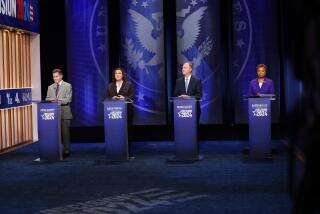Presidential Hopeful McCain Calls for Ban on ‘Soft Money’
- Share via
Declaring money the root of all political evil, Republican presidential candidate John McCain challenged his campaign peers Tuesday to pressure Congress to reform the nation’s political funding apparatus.
In an insistent and passionate address to Town Hall Los Angeles, McCain cited specific programs forwarded by his fellow presidential candidates that either have been defeated or will be, he said, because special interests hold sway.
“We won’t reform anything until we first reform the way we finance our political campaigns,” the Arizona senator told several hundred members of the civic group meeting at a downtown hotel. “As long as special interests dominate campaigns, they will dominate legislation as well.”
There were no immediate takers in response to McCain’s plea for a united presidential candidate front against “soft money,” the huge sums that are dumped on political parties to finance get-out-the-vote activities. The money is not supposed to benefit individual candidates, but critics say it inevitably does.
Only one major Republican candidate, former Red Cross President Elizabeth Hanford Dole, said that she favors a soft money ban, but she had staked out her position before McCain’s speech.
McCain’s effort was not purely rhetorical. With Senate leaders stalling a vote on the campaign finance reform bill co-sponsored by McCain and Democrat Russell Feingold of Wisconsin, a little pressure from a potential president couldn’t hurt.
But the plea also served to reinforce McCain’s image as the iconoclast of the GOP field, a candidate willing to take on the status quo.
McCain strategists have suggested that, although the senator began fighting for campaign finance reform well before his run for the presidency, his push for a vote on the matter next month could invigorate his campaign.
In much the same fashion, McCain benefited earlier this year from his early and vociferous opinions in favor of U.S. military involvement in Kosovo, which were uttered at a time many in the party appeared befuddled over what tactics were acceptable.
McCain, unlike most of the Republican field, favors shutting off the political world’s strongest financial artery, the soft money loophole. Virtually unheard of two decades ago, soft money has become the dominant force of the national political parties, enabling them to take in sums well over the maximum $1,000 an individual may give a candidate.
In his speech Tuesday, McCain connected the failure of reforms in several areas--education, military spending, taxes and overall government spending--to the heft of political donors who pressured legislators to see things their way.
“Those of us who are privileged to hold public office have ourselves to blame for the sickness in American public life today,” McCain said. “It is we who have exploited the public trust, who have time and again, in full public view, placed our personal and partisan interests above the national interest, ensuring the public’s contempt for our poll-driven policies, our formal posturing, the lies we call spin and the damage control we substitute for progress.
“It is we who are the defenders of a campaign finance system that is nothing less than an elaborate influence-peddling scheme in which both parties conspire to stay in office by selling the country to the highest bidder.”
McCain argued that corporate interests have besmirched the tax code for their benefit, and that teachers unions have thwarted school reforms to sustain the status quo.
He specifically mentioned the flat-tax plan advocated by Republican candidate Steve Forbes and the tax rate cut proposed by candidate Dan Quayle as doomed by the desires of special interests. He said that Texas Gov. George W. Bush’s school voucher plan had been defeated by special interests, as had House Budget Committee Chairman John Kasich’s tax cut plans.
Despite the sympathetic words, however, there was little inclination by the other candidates to leap aboard McCain’s bandwagon.
David Beckwith, a spokesman for the Bush campaign, on Tuesday reiterated the Republican front-runner’s support for banning any soft money donations from corporations or unions that are made without the permission of stockholders or members. But Bush, in a visit to Los Angeles last week, specifically ruled out limiting donations from individuals.
“I wouldn’t support a limitation on giving someone the freedom to contribute that which they want to contribute,” he said. “But there needs to be disclosure.”
Dole spokesman Ari Fleischer said Dole backs a complete ban on soft money donations, whether from corporations, individuals or unions. Todd Harris, a spokesman for Kasich, said the Ohio representative and presidential candidate opposes a soft money ban because it “puts undue limits and restrictions on individual and organizational 1st Amendment rights.”
Former Vice President Quayle also opposes McCain’s proposal, insisting that term limits and a simplified tax code will limit the reign of special interests.
Millionaire businessman Forbes, said campaign manager Bill Dal Col, favors both term limits and an alternative to the McCain-Feingold bill that would substantially raise the current $1,000 cap on individual donations to presidential candidates and require full disclosure. Dal Col said Forbes also believes that pushing through the flat tax would, in effect, eradicate the special interests whose desires are woven into the present system.
Bush and Dole also favor raising the $1,000 donation level, which has not been adjusted since it was enacted in 1974. McCain said Tuesday that he was open to such a move, but only in concert with a ban on soft money donations.
To do otherwise, he said, “is like putting a Band-Aid on a ruptured artery.”
*
Audio of Sen. John McCain’s speech at Town Hall Los Angeles, including his answers to questions from latimes.com users, is on The Times’ Web site:
https://www.latimes.com/mccain
More to Read
Get the L.A. Times Politics newsletter
Deeply reported insights into legislation, politics and policy from Sacramento, Washington and beyond. In your inbox twice per week.
You may occasionally receive promotional content from the Los Angeles Times.











